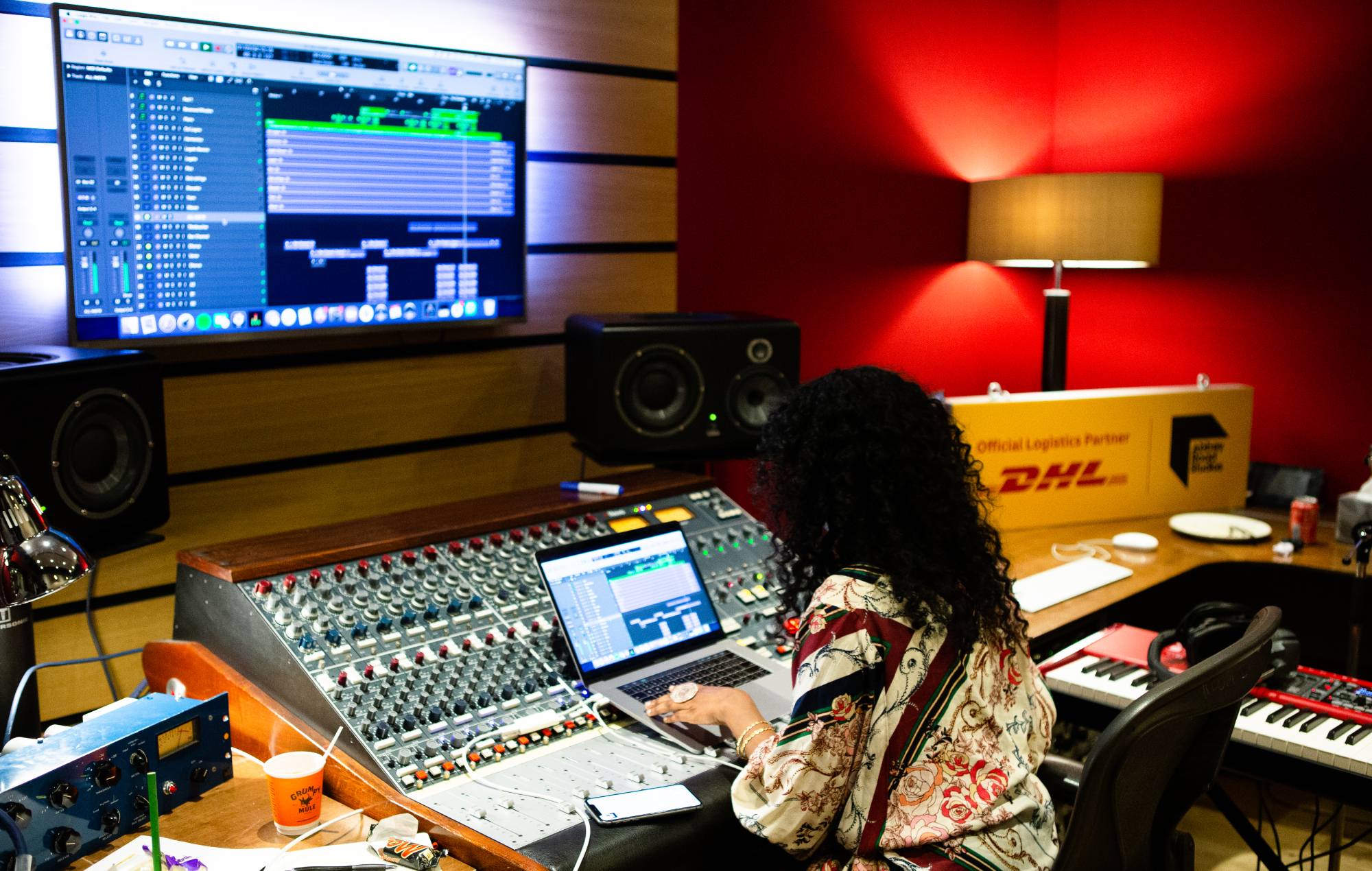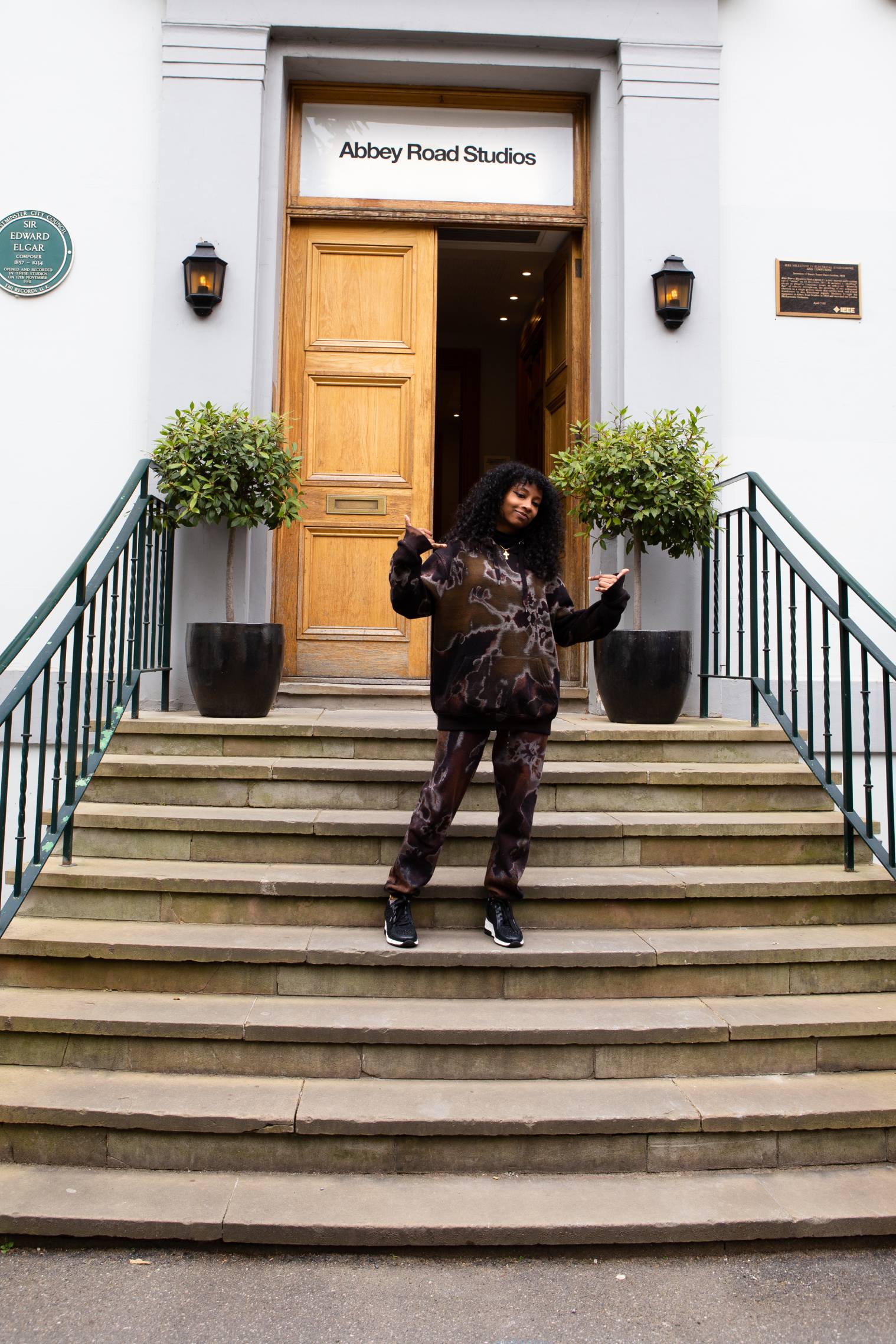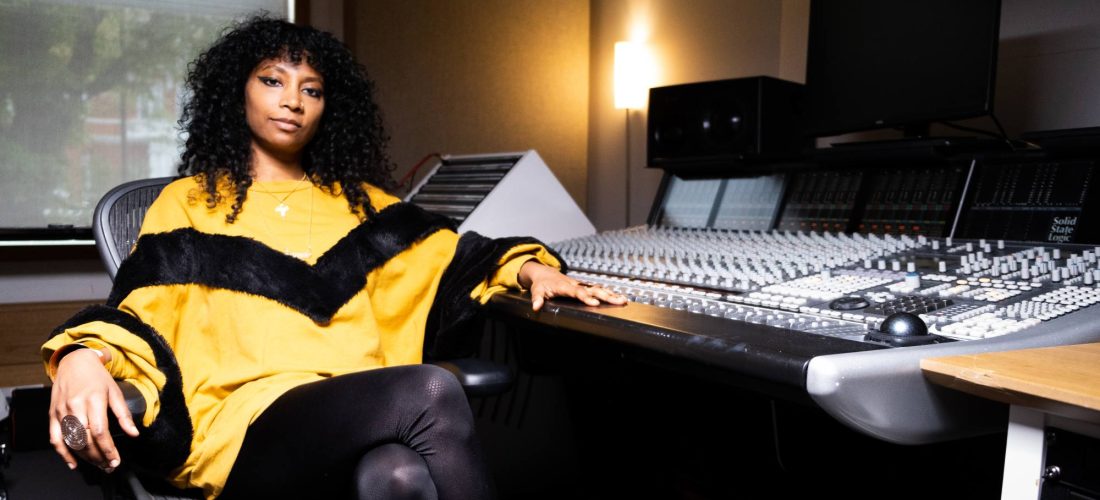Hannah V on DHL FAST-TRACK Sessions 2023: “The experience of recording at Abbey Road lasts a lifetime”
In partnership with DHL FAST-TRACK Sessions
The return of DHL FAST-TRACK Sessions — a grassroots music initiative that aims to accelerate the local to global journey of three emerging artists — for 2023 is being made even more special by the return of gold-selling record producer Hannah V. The Berlin-born creative played a pivotal role in the initiative’s hugely successful launch last year, providing guidance, mentoring and production for our three lucky inaugural winners at the legendary Abbey Road Studios.
“I can’t wait to go back in with this year’s winners,” Hannah tells NME ahead of returning to Abbey Road. “This is the second year I’ve done DHL FAST-TRACK Sessions, so in a way I’m more comfortable, I know what we need to get out of it and I know what the artists will get out of it. I’m really excited to get the winners in, listen to the songs, produce them up, brainstorm, bring in [outside] musicians. It’s going to be incredible [but] hardcore: that’s part of the learning experience. We’re there to work and we’re gonna work hard! But it’s going to be a celebration of music.”
As well as previewing this year’s initiative, Hannah also told NME about her own journey to the top, what advice she’d impart to budding producers and why it’s more important than ever to support grassroots music.
NME: What path did you take to music production?
Hannah V: “My path was slightly unusual. I decided that I wanted to study jazz, so I came to London to study at the Royal Academy of Music. After graduating, I realised that you can’t make a lot of money playing jazz unless you’re one of the best in the world — which I wasn’t! A few years later I was asked to play keyboards at a session and I took to it quite naturally, which kick-started my career as a pop session musician. I played with Sugababes, Anastacia, Jason Derulo and Taio Cruz, before I was then asked to be Rihanna‘s [live] keyboard player for a year: that was amazing, because you get to play with the best musicians in the world and travel the world. I was then Jessie J‘s keyboardist for three years, so I was on the road for about eight years.
“I was always producing on the side, but not particularly seriously. Whenever I was travelling with producers on tour I’d sit next to them, watch them produce and pick up a few tips: that’s how I learned production. I felt like I needed a change after eight years on the road, which was pretty crazy because I was on top of the game — I absolutely could’ve done that forever. But I got tired of hardcore travelling: the tours I was on meant you were away from home for eight months, and home becomes an illusion. Something in me just said, ‘I’ve done all the main stages I’ve wanted to, I’ve seen the world and done some amazing things. Is the rest of my life just going to be behind another pop star?’ As amazing as it was to play Wembley Stadium, it was never a dream of mine: my dreams were playing the Blue Note Jazz Club in New York. So I decided to take the plunge by quitting session playing and getting into production.”

What was your first big break as a producer?
“I got signed by Sony as a producer/artist, so I had enough of an advance to survive for six months. I realised very quickly that, in the studio world, no-one cared about my life story. So as amazingly as I’d done on [the live circuit], in studio world people were like, ‘Cool that you played with Rihanna. Have you produced for her?’ And I’d have to say no. ‘Who have you produced for?’ I’d reply: ‘Well, no-one’. So I had to build myself from the bottom, which is a bit humbling when you’re not 19 any more. This is now my eighth year as a full-time producer, and it’s absolutely the best decision I’ve ever made in my life. It took three-to-four years to establish myself as a producer, but my main artist, JP Cooper, got me my first top 10 UK record and my first plaques with his 2017 debut album ‘Raised Under Grey Skies’. Doors opened after that: it got me working at Abbey Road for the first time, and as the artists I was working with became successful, that added to my stripes.
“I adore my job. I’ve worked with all kinds of different artists, including established artists. But I adore working with artists who are at the beginning of their journey, because I feel like the hunger is still there and they don’t know the rules yet, which is great. There’s a certain amount of creativity and wildness there that I don’t want to tame, but preserve instead.”
What are your top tips for any budding producers out there?
“You have to be really good at your job! It’s a cutthroat industry and there’s a lot of people wanting to [produce], so it goes without saying that you have to have a certain technical ability, and the only way you can become good [at producing] is by doing it again, again and again. There are no shortcuts to becoming good: you just have to show up and make music, if you’re in the position to, every single day. We all have years and years and years where you don’t do anything else: you just eat and sleep music. That’s what sharpens your instincts, makes you learn how to deal with artists, deadlines and delivering tracks, not to mention working on days where the inspiration isn’t flowing, because nobody cares about that. If it’s your hobby, then cool, don’t do it on that day. But if it’s your job, you’ve got to find that creativity somehow, no matter how tired, jet-lagged or hungover you are! You need to study every day. I’m still learning new things, watching tutorials, making sure I’m on top of my technology and getting advice from friends every day.
“As producers we’re in a very privileged position where artists trust us with their stories — it’s more than music. They’ll come into the studio and 30 minutes later be telling you their deepest, darkest secrets. That’s what we’re trying to do here, write honestly about real-life situations and stories. As a producer, our job is to make the artist comfortable and feel safe, as well being open to their stories to turn them into a song. It’s something that people don’t talk about a lot: how as a producer you can get the best out of your artists [this way]. Away from the technical abilities, the human element is so, so important to our jobs.”

How much have you enjoyed being part of DHL FAST-TRACK Sessions?
“I love it. Like I said before, I love working with artists at the start of their journey, and being able to invite those artists to Abbey Road brings me the deepest joy. I’m obsessed with working at Abbey Road! I remember how nervous I was when I walked in there for the first time, thinking, ‘Little old me, I don’t deserve to be here’. I couldn’t sleep for days! Then you walk into the building and you realise that, instead of being overwhelming, the legacy of the place is inspiring. The engineers there are so on your side, it’s amazing: they’re the best in the world. It all helps it become less intimidating, and it’s just there for you to be creative. I love sharing that experience with artists who are coming to Abbey Road for the first time, and let me be there while you walk through these hallowed halls and into these studios thinking, ‘Wow’. There’s something so confidence-building about working at the most famous studio in the world and being like, ‘I’m just doing music, I’m doing what I do but I’m just doing it here’. It’s life-affirming. I’m really excited for this year’s artists to experience what I experienced, basically.”
Any fond memories of working with the 2022 winners at Abbey Road?
“100%! It’s quite hard to describe, but there’s something that’s so special that happens when you make music together. There’s a bond between the creators, and it doesn’t matter how many cameras are there or where the studios are, there’s just something special that happens when we make music together. I’m still in touch with Mo Othman, Rosie Charles and Kohzee all the time, they’re my artists! That’s part of being a producer: my phone blows up all the time with my artists, and that’s fine because it’s a strong bond that’s never broken, even if we don’t have the chance to be work together again. What we had and what we shared was such a special experience, because making music is such a special experience!”
How important is it that initiatives like DHL FAST-TRACK Sessions exist to support and champion grassroots new music?
“It’s so important on so many different levels. On a tangible level, you get a track that’s recorded, mixed and mastered at Abbey Road that you can put out: that’s incredible. You’ve got a song that’s been made in the biggest and most famous studio in the world! But more than that, for me, the experience is really special. You walk into Abbey Road and you’re treated with total respect by the whole team there: the engineers will treat anyone like they treat Noel Gallagher. There’s something that happens to your confidence after walking in and being a bit unsure of whether you deserve to be there, and then just being treated like an artist and a musician [by the engineers]. The boost all the artists get from it, that’s what surpasses music.
“After you’ve spent three-to-four days at a place like Abbey Road — where everyone is there to support you and doing it for genuine reasons — and being taken that seriously in a place that special, that’s seen so many incredible musicians come through, makes you stand and walk taller. That experience is something that will last for a lifetime.”
You can find out more about DHL FAST-TRACK Sessions here.
